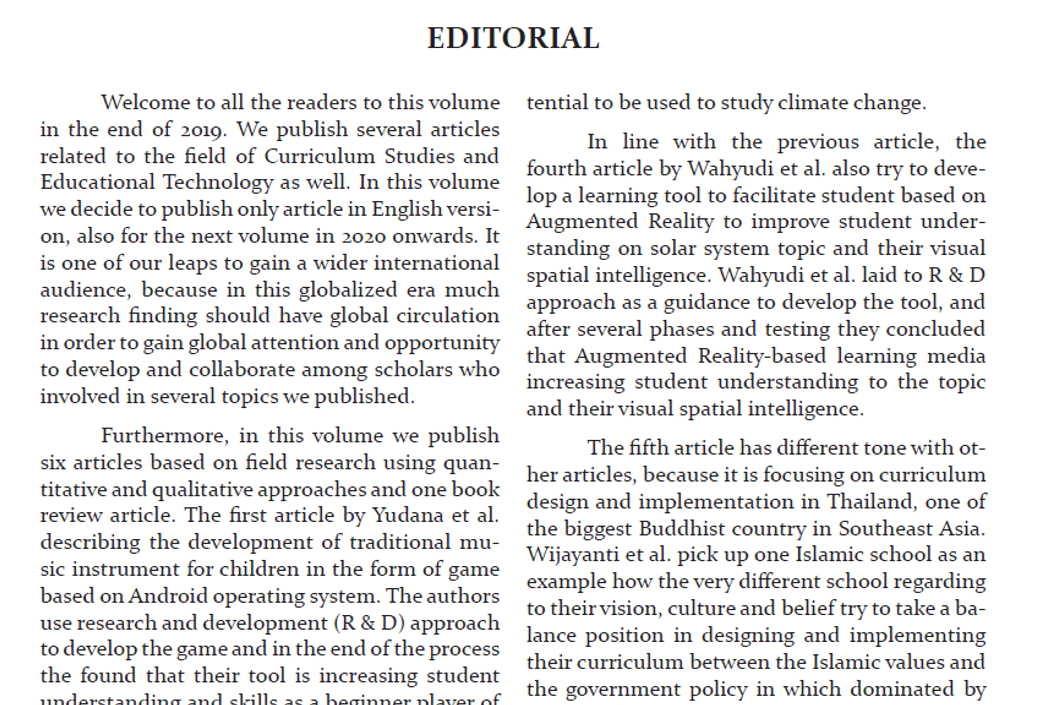Abstract
Welcome to all the readers to this volume in the end of 2019. We publish several articles related to the field of Curriculum Studies and Educational Technology as well. In this volume we decide to publish only article in English version, also for the next volume in 2020 onwards. It is one of our leaps to gain a wider international audience, because in this globalized era much research finding should have global circulation in order to gain global attention and opportunity to develop and collaborate among scholars who involved in several topics we published.
Furthermore, in this volume we publish six articles based on field research using quantitative and qualitative approaches and one book review article. The first article by Yudana et al. describing the development of traditional music instrument for children in the form of game based on Android operating system. The authors use research and development (R & D) approach to develop the game and in the end of the process the found that their tool is increasing student understanding and skills as a beginner player of traditional music instrument, especially in this case is Javanese traditional music.
The second article by Paramitha illustrating how smartphone that almost every student has it is powerful enough to facilitate and enhancing student digital art literacy. Through using such application called Sketchbook student could create and manipulate the pictures and photographs end yield many style and kind of digital art products. Paramitha said that using smartphone lead the student learning process more fun and meaningful, because they could interact with other student, discuss, and appreciate their own interest when they decide to choose what type of illustration the want.
Third article by Anggraeni et al. in line with the recent global movement on climate change environmental problems. The authors try to develop Android-based module to learn climate change topic for student. They use Design and Development Research (DDR) approach to produce the module and Search, Solve, Create, and Share (SSCS) learning model in order to enhance student critical thinking about the topic. The module they produced seems have huge potential to be used to study climate change.
In line with the previous article, the fourth article by Wahyudi et al. also try to develop a learning tool to facilitate student based on Augmented Reality to improve student understanding on solar system topic and their visual spatial intelligence. Wahyudi et al. laid to R & D approach as a guidance to develop the tool, and after several phases and testing they concluded that Augmented Reality-based learning media increasing student understanding to the topic and their visual spatial intelligence.
The fifth article has different tone with other articles, because it is focusing on curriculum design and implementation in Thailand, one of the biggest Buddhist country in Southeast Asia. Wijayanti et al. pick up one Islamic school as an example how the very different school regarding to their vision, culture and belief try to take a balance position in designing and implementing their curriculum between the Islamic values and the government policy in which dominated by the Buddhist values.
Next, the sixth article by Sediyani et al. describing how problem-based learning and experiential learning have significant contribution to the learning result on civil servant official training program. But it seems that both learning models do not have significant differences, except in the learning result in which the class who employ experiential learning gaining slightly higher result the problem-based learning model.
The last article is book review, it is by one of our prominent editors, Subkhan. He briefly summarizes the work of Wayne Au entitled Critical Curriculum Studies (2012). Subkhan proposes that the critical re-turn of curriculum studies is important in order to develop the field and using it as epistemological foundation to bring learning practices more democratic, humane, and socially just.
At least, same with the previous volume, we thanks to all authors, editors, reviewers and readers for your immense and valuable participation for the publication of this volume and onwards.
Semarang, November 2019
Editor -In-Chief
References
-
